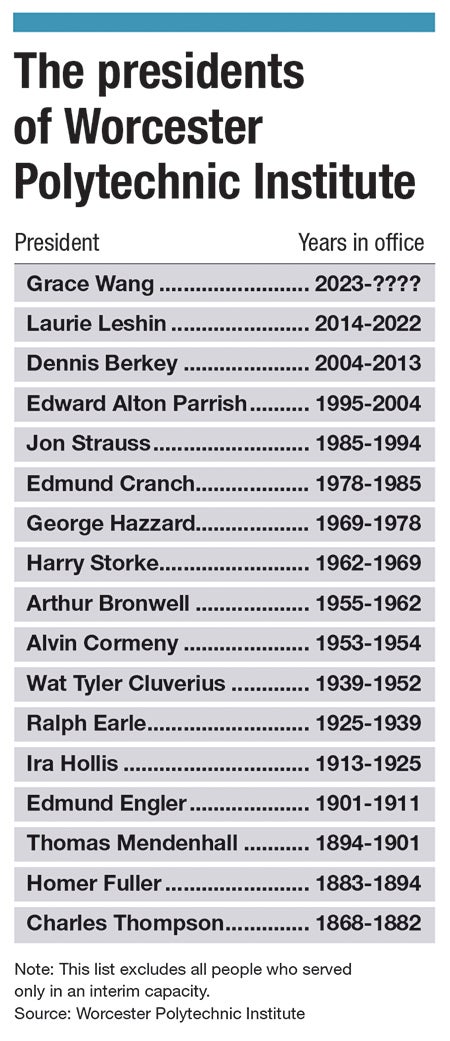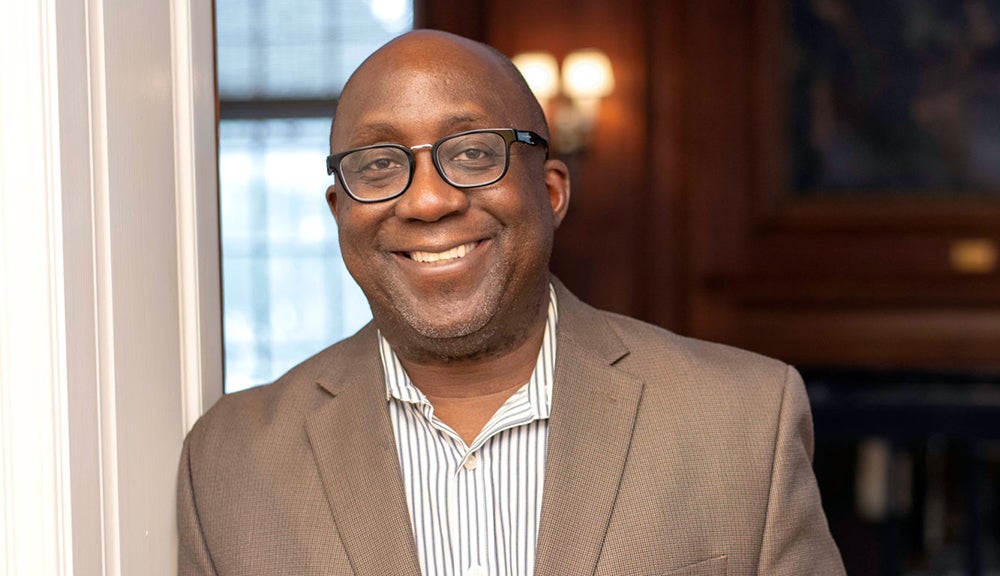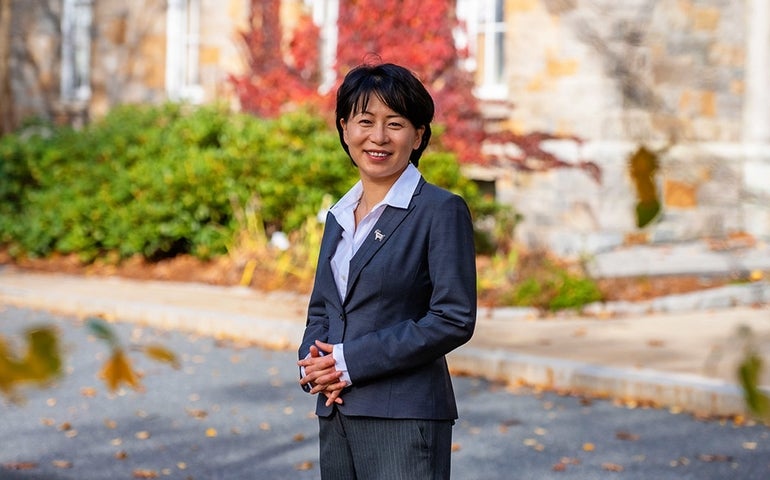“Grace” Jinliu Wang, who on Nov. 7 was selected by WPI to be its 17th president, believes in and embodies this concept of combining theory and practice to fuel innovation and to apply that innovation to have maximum impact on the world.
Get Instant Access to This Article
Subscribe to Worcester Business Journal and get immediate access to all of our subscriber-only content and much more.
- Critical Central Massachusetts business news updated daily.
- Immediate access to all subscriber-only content on our website.
- Bi-weekly print or digital editions of our award-winning publication.
- Special bonus issues like the WBJ Book of Lists.
- Exclusive ticket prize draws for our in-person events.
Click here to purchase a paywall bypass link for this article.
Worcester Polytechnic Institute was founded in two buildings exemplifying its philosophy as a school blending theory and practice. The Washburn Shops, named after wire-making titan Ichabod Washburn, was a functioning manufacturing plant. Boynton Hall, named after tinware manufacturer John Boynton, was filled with labs and classrooms for teaching students theories in engineering and science.
In 1970, the school crystallized its approach to learning with what it calls the WPI Plan, which emphasizes real-world experience and an interdisciplinary approach to solving global problems.
“Grace” Jinliu Wang, who on Nov. 7 was selected by WPI to be its 17th president, believes in and embodies this concept of combining theory and practice to fuel innovation and to apply that innovation to have maximum impact on the world.

“I have been admiring WPI for many years. WPI’s approach to project-based learning is very distinctive, and it’s amazing that WPI has been doing this for over 50 years, using the WPI Plan, which is amazingly forward-thinking,” said Wang to WBJ via Zoom while she took a break from a board meeting at The Ohio State University.
Wang is still serving as the executive vice president for research, innovation, and knowledge at OSU. She will assume her role as WPI’s president on April 3.
“Dr. Wang is precisely the leader WPI needs to take project-based learning and purpose-driven research to the next level,” WPI Board Chair William Fitzgerald said in a Nov. 7 WPI press release announcing Wang’s selection as president.
Academia & its impact on society
Innovation and the impact innovation can have on the world seems to drive Wang.
Wang sees her career as a journey. After earning her bachelor’s and master’s degrees in polymer materials from Beijing University of Chemical Technology in China, she went to Illinois, where she garnered a PhD in materials science from engineering at Northwestern University.
After school, Wang wanted to get out and see the world beyond academia.
“I wanted to know what the real-world impact of the technology was,” said Wang.
She spent eight years at four jobs employing her expertise in Silicon Valley with IBM and Hitachi Global Storage Technologies. Her work focused on data recording media, for which she holds seven patents.
In 2009, Wang moved on to the National Science Foundation, an independent government agency supporting research and education in non-medical science and engineering fields. She rose through the ranks from a program director to acting assistant director for engineering, where she managed a $900-million funding portfolio investing in engineering research, education, and technology commercialization.
During her time at the NSF, Wang found herself drawn back to academia.
“I realized how important education is, and I knew that is where I wanted to be, to really be there with the faculty, students, and staff, to make a tangible impact,” she said.
In 2017, Wang joined the State University of New York as a professor and vice chancellor for research and economic development for the university system. A hard charger, she quickly became interim provost for the SUNY system and eventually served as interim president of SUNY Polytechnic Institute and senior vice chancellor for research and economic development of the SUNY System. She oversaw $1.7 billion in research and development spending and grew research partnerships while improving access and success for students.
“She is a proven consensus builder who gets to the right decisions at the right time for the right reasons. Building mutually beneficial collaborations has been central to her success and that of the institutions she has served,” Fitzgerald said.
Innovating with the private sector
At The Ohio State University, Wang consolidated multiple offices to create the Enterprise for Research, Innovation and Knowledge, bringing ideas developed at OSU out into the world by overseeing research funding, developing corporate partnerships, and advancing entrepreneurship.
Wang has overseen construction of the first phase of The West Campus Innovation District at OSU – now called Carmenton, named after the Ohio State song “Carmen Ohio” – to create a 270-acre live-work-play district.
WPI has a similar innovation district, where the latest additions to the school’s Gateway Park were announced in late October. Gateway Park was founded in 2010 and currently consists of three buildings, which house WPI academic and research programs, administrative offices, and businesses.
Gateway Park was once an area occupied by defunct industrial space. WPI built up the area which sits at one of the entrances to the downtown area near Lincoln and Grove streets.
“Worcester is one of the fastest-growing cities in New England. That’s really a sign of the excitement and the potential for future growth there,” said Wang, “It’s really one of our responsibilities, and it’s an opportunity as well, to play a significant role and partner with the city, the state, our investors, and community leaders on this project.”
President of color
Wang will be the first person of color to serve as WPI president on a non-interim basis. She will be one of three women, and one of three people of color, serving as president at one of the 15 Central Massachusetts colleges.

“In higher education, one of the most persistent patterns in the distribution of power has been the inequality between men and women in presidential roles. Having another female voice at the HECCMA board table will help even out the balance of power in our regional higher ed landscape,” said Jeanine Went, executive director of the Higher Education Consortium of Central Massachusetts, of which WPI and 10 other local colleges are members.
WPI’s last president was Laurie Leshin, the school’s first woman president. Leshin left WPI to become director of NASA’s Jet Propulsion Laboratory. The school’s provost and senior vice president, Winston Oluwole “Wole” Soboyejo is acting as interim president until Wang starts, and he is the first person of color to lead the school.

During her time as president, Leshin prioritized diversifying the student body, particularly by recruiting more female students. Under Leshin, the school went from about a quarter of its student body being women at the beginning to her tenure to 44% women with the Class of 2021, the most gender diverse in the school’s history.
“WPI started recruiting female students very early,” Wang said. “And today on campus, we have this tremendous commitment to diversity, inclusion, equity, and justice.”
For Wang, it's not just about representation in leadership, but about being inclusive so WPI can attract the best talent and achieve the best results.
“Everybody needs to be respected, welcomed, supported and feel belonged, right?” she said. “Once we do that, we bring the best … Diversity of thoughts, diversity of minds, and that's the foundation of innovation.”
Community impact
Wang feels strongly about the good a university can do in a community. At OSU, she helped to found a program called STEAMM Rising Columbus to develop local talent in innovation fields by training and developing 500 STEAMM teachers at Columbus City School by 2025.. (STEAMM stands for science, technology, engineering, arts, mathematics and medicine.)
WPI operates the Massachusetts Academy of Math and Science, which offers select Mass. high school students the opportunity to take advanced classes in their junior and senior years at WPI.
“I want the students to not only understand STEM, but to be passionate about how STEM can impact the world,” said Wang, “And this is not achieved through STEM alone. It's really important for students to learn art, humanities, history, and culture, because without that kind of a knowledge base, it's really difficult to have an effect on the world.”
Wang envisions WPI advancing its role in growing STEM industries in Central Massachusetts and beyond.
“WPI is really at the forefront of what we need in the future to address some really large, pressing societal challenges, not only by doing research, but by offering the best and brightest, most job-ready workforce for the future,” she said. “WPI is at a very exciting juncture together with our city and our region.”

